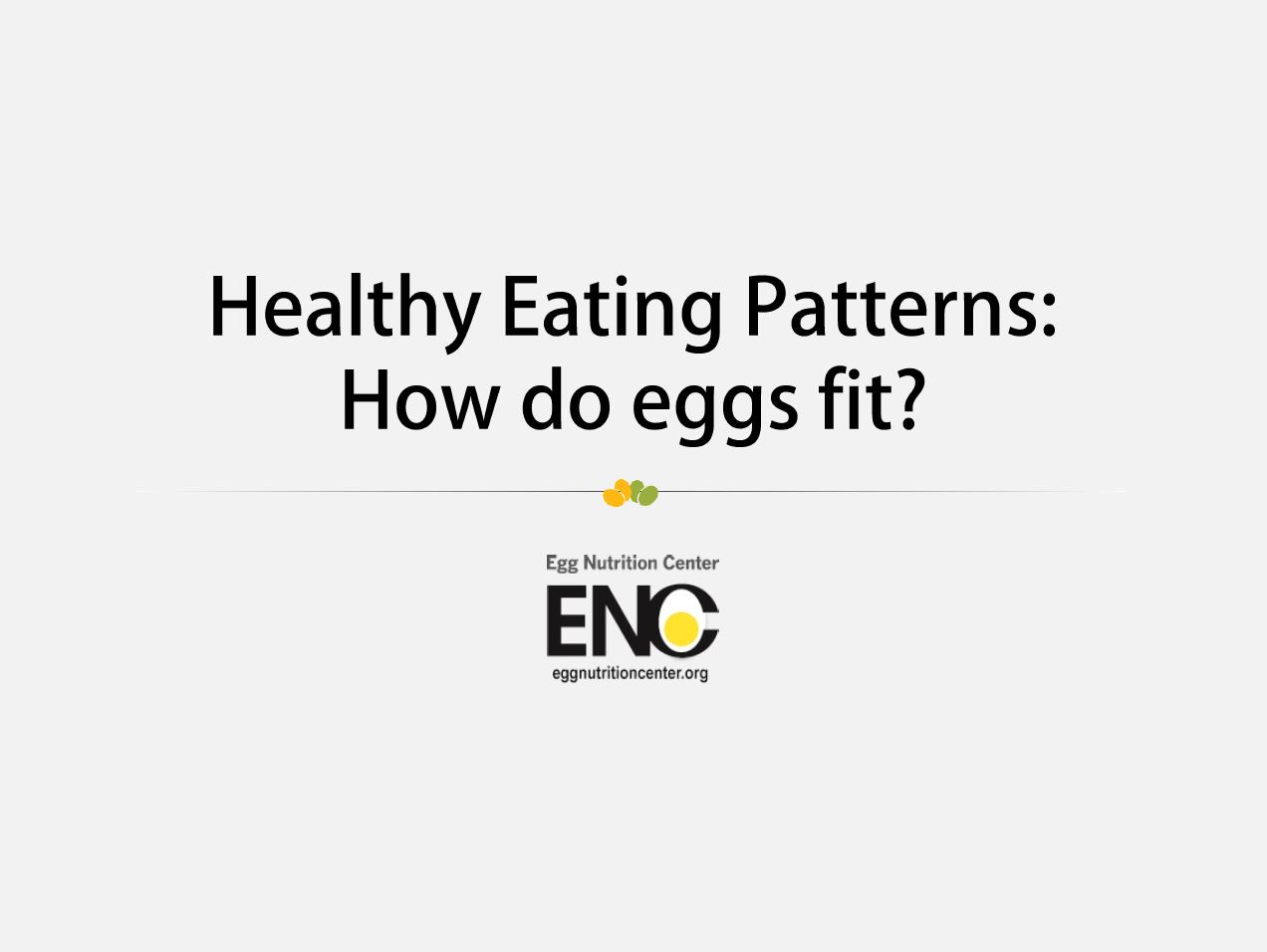Dietary patterns (also called eating patterns) are the combinations and quantities of food and beverages consumed over time. Consistent evidence indicates that, in general, a plant-based dietary pattern is more health-promoting than the current average U.S. diet. However, a “plant-based” eating patterns doesn’t mean only plants; pairing high-quality protein foods, like eggs, with plants is essential for the synthesis and maintenance of muscle tissue, and for achieving optimal vitamin and mineral intakes.
The 2015-2020 Dietary Guidelines for Americans recommend three healthy eating patterns, all of which include eggs. But what are the sample eating patterns, and what are the key differences between them?
To learn more about healthy eating patterns, including those recommended in the 2015-2020 Dietary Guidelines, and how eggs fit within those patterns, explore the following PowerPoint, and feel free to share it with friends!
U.S. Dietary Guidelines Advisory Committee Recommends Eggs as a First Food for Babies and Toddlers

By: Mickey Rubin, PhD, Executive Director of American Egg Board’s Egg Nutrition Center
July 15, 2020
Today is an important day for the American diet and for eggs. In an historic first, the Dietary Guidelines Advisory Committee today issued recommendations for birth to 24 months old and specifically recommended eggs as an important first food for infants and toddlers, as well as for pregnant and lactating women.
Today’s Scientific Report also highlighted the importance of a nutrient plentiful in eggs – choline – while recommending eggs as a first food for babies to reduce risk for an egg allergy. The Advisory Committee additionally encouraged eggs for pre-teens and adolescents.
Eggs are one of the best sources of choline, an essential nutrient critical for fetal brain development. The Advisory Committee classified choline as an important nutrient that is under-consumed by all Americans. Importantly, 92% of pregnant women fail to meet the daily Adequate Intake (AI) recommendations for choline.
The Advisory Committee also specifically recommended eggs as an important first food. The latest research on food allergy prevention recommends introducing eggs when your baby is 4-6 months old and developmentally ready to help reduce the chances of developing an egg allergy. Eggs are an important first food as they provide eight essential nutrients that help build a healthy foundation for life.
Eggs are a nutritional powerhouse that contribute to health and wellbeing at every age and life stage, providing critical nutrients including protein, choline, riboflavin (vitamin B2), vitamin B12, biotin (B7), pantothenic acid (B5), iodine and selenium, which are valuable for supporting muscle and bone health, brain development and more. The Advisory Committee also noted eggs are a source of vitamin D, a nutrient of public health concern because it is under-consumed by all Americans.
Additionally, the Advisory Committee reinforced the strong body of evidence that dietary cholesterol is not a nutrient of concern. The science on eggs and cholesterol has been steadfast. The vast majority of scientific evidence shows egg consumption is not associated with cardiovascular disease. In fact, a recent Harvard University study that evaluated more than 30 years of data reaffirmed that eating eggs is not associated with cardiovascular disease. Leading health organizations such as the American Heart Association also state that eggs can be part of heart-healthy diet patterns.
As Americans are building healthier diets, you can count on eggs. For more information on building a healthy diet with eggs, please visit EggNutritionCenter.org.
Every Bite Counts: Why Eggs are an Important First Food

By: Jen Houchins, PhD, RD
The 2020 Dietary Guidelines Advisory Committee says “every bite counts” when it comes to feeding infants and toddlers. This is the first time in Dietary Guidelines history that the DGAC is making recommendations for the Birth to 24-month lifestage and addresses complementary feeding as “a critical period for growth and development… characterized by high nutrient needs in relation to the amount of food consumed.1”
The Advisory Committee specifically recommended eggs as an important first food for infants and toddlers as they are a rich source of choline and because early introduction of eggs (after 4 months of age), when baby is developmentally ready, may help reduce the risk of developing a food allergy.
The following breaks down recommendations from the Advisory Committee based on age group.
BIRTH TO 6 MONTHS
For approximately the first 6 months of age, human milk, infant formula, or a combination of the two are an infant’s sole source of nutrition. Once developmentally ready (>4 months of age) – baby has good head and neck control, can sit upright, has lost the tongue-thrust reflex, and shows interest in food – complementary foods can be introduced.
6-12 MONTHS
During the 6-12 month period, an infant continues to receive human milk, infant formula, or a combination of the two, but also starts transitioning to a varied diet that includes complementary foods and beverages. This is where nutrient-rich foods with essential nutrients for growth and development come into play. The Advisory Committee recommends a variety of animal-source foods (meat, poultry, seafood, eggs, and dairy), fruits, and vegetables, nuts and seeds, and whole grain products in age-appropriate forms, beginning at ages 6 to 12 months, to provide key nutrients and build healthy dietary habits.
For infants fed human milk, the Committee recommends complementary foods that contain iron and zinc, such as meats and fortified infant cereals. Modest amounts, (i.e., less than 1 ounce equivalent per week), of seafood, eggs, and nuts is recommended for infants 6 to 9 months and minimum weekly amounts of 3 oz seafood, 1 egg, and 0.5 oz, respectively, by ages 9 to 12 months. Further, the DGAC recommends prioritizing fruits and vegetables, particularly those rich in potassium, vitamin A, and vitamin C, to provide adequate nutrition, but also to foster acceptance of these healthy foods.
During this time, the Committee also recommends the introduction of peanut-containing foods and eggs, to help reduce the risk of developing food allergies. Additionally, introducing baby to complementary foods like eggs, which are high in choline, supports brain health.2,3 It should also be noted that complementary feeding not only provides additional nutrients, but introduces different textures, and models healthy eating behaviors, as well. The table below outlines approximate amounts of complementary foods and beverages for ages 6 to 12 months.1

12-24 MONTHS
As baby moves past the 12-month mark and into the second year of life, many move away from human milk and infant formula entirely and transition to a fully varied diet of nutrient-rich foods and beverages. Others may choose to continue offering human milk in addition to a varied diet of nutrient-rich foods and beverages. Either way, the food patterns for this age group is consistent with proportions of food groups and subgroups recommended for children ages 2 years and older, which requires careful choices of foods to meet nutrient needs. The DGAC emphasizes offering developmentally appropriate forms of nutrient-rich animal-source foods, including meat, poultry, seafood, eggs, and dairy products, as well as nut and seed containing foods, fruits, vegetables, and grain products in age-appropriate forms. For toddlers whose diets do not include meat, poultry, or seafood, the Committee recommends eggs and dairy products on a regular basis, along with soy products and nuts or seeds, fruits, vegetables, grains, and oils. The tables below outline approximate amounts of foods and beverages for toddlers between the ages of 12 to 24 months, for those not receiving human milk or infant formula, those fed human milk, and for those following a vegetarian style eating pattern.1



EGGS AS A FIRST FOOD FOR INFANTS AND TODDLERS
Eggs are recommended after four months and when baby is developmentally ready for complementary foods, and throughout infancy and toddlerhood.
- Eggs are a nutrient-rich choice providing a good or excellent source of eight essential nutrients.
- Eggs provide various amounts of all the nutrients listed by the American Academy of Pediatrics4 as essential for brain growth.
- Introducing eggs early and often may help reduce risk of developing an allergy.
- Eggs are an affordable source of high-quality protein.
- Eggs are versatile and can be used to make a wide variety of dishes and can be adjusted to fit various developmental stages and age-appropriate textures.
Interested in more information?
- Handout: Eggs as a First Food Infographic
- Handout: Pregnancy and Birth to 24 Months toolkit
- Read: Eggs – An Essential Complimentary Food
- Read: Early Introduction of Eggs May Reduce the Risk of Developing an Egg Allergy
Check out these recipes for infants and toddlers:
- Recipe: Peanut Butter Sweet Potato Soufflé
- Recipe: Eggy Peanut Butter Muffins
- Recipe: Peanut Butter Oatmeal with Egg
- Recipe: Peanut Butter Egg Scramble
- Recipe: Savory Egg Veggie Pancake
- Recipe: Baby’s First Pancakes
- Recipe: Egg Veggie Casserole
References
- Dietary Guidelines Advisory Committee. Scientific Report of the 2020 Dietary Guidelines Advisory Committee: Advisory Report to the Secretary of Agriculture and the Secretary of Health and Human Services,. 2020; Available from: https://www.dietaryguidelines.gov/sites/default/files/2020-07/ScientificReport_of_the_2020DietaryGuidelinesAdvisoryCommittee_first-print.pdf
- Wallace, T.C., A Comprehensive Review of Eggs, Choline, and Lutein on Cognition Across the Life-span. J Am Coll Nutr, 2018. 37(4): p. 269-285.
- Wallace, T.C., et al., Choline: The Underconsumed and Underappreciated Essential Nutrient. Nutr Today, 2018. 53(6): p. 240-253.
- Schwarzenberg, S.J., et al., Advocacy for Improving Nutrition in the First 1000 Days to Support Childhood Development and Adult Health. Pediatrics, 2018. 141(2)
How to Incorporate Eggs into the Mediterranean Diet

By Natalie Rizzo, MS, RD
The Egg Nutrition Center partnered with Natalie Rizzo, MS, RD to write this blog post.
Although it has the word “diet” in the name, the Mediterranean Diet is a flexible style of eating that isn’t centered around weight loss. There aren’t any strict rules or calorie counting on the Mediterranean Diet, either. Rather, it encourages eating like people do in the Mediterranean region — a nutritious eating pattern full of whole foods.
Named as the #1 Best Overall Diet by US News & Report, the Mediterranean Diet is a healthy style of eating that promotes portion control, whole foods and an active lifestyle. Eating the Mediterranean way includes plenty of colorful fruits and vegetables, beans and legumes, whole grains, fish, poultry, eggs, olive oil and fresh herbs. Even a glass of red wine in moderation is encouraged. However, this eating pattern also involves limiting intake of refined grains, red meat, processed or packaged foods and foods that are high in added sugar.
In addition, lifestyle factors are an important aspect of the Mediterranean Diet. Avoiding tobacco and exercising regularly are healthy habits no matter what, but the Mediterranean Diet also encourages cooking your own meals, choosing seasonal ingredients and enjoying mealtime with family and friends.
The benefits of the Mediterranean Diet
As one of the top diets in the world, there is an abundance of research surrounding the Mediterranean Diet and how it affects certain health conditions. Below are some of the most promising fields of study.
Heart health
The Med Diet is rich in nutrients that are associated with good heart health, like fiber, antioxidants, vitamins, minerals and healthy fats. With that, the Mediterranean Diet has been shown to help protect against cardiovascular disease. As a matter of fact, a large observational study of over 30,000 women found that those who followed the Med Diet for a 10-year period had lower risk of heart attacks, strokes, and heart failure.
With the revision of the Dietary Guidelines in 2015 to remove cholesterol as a nutrient of concern, eggs have been considered a part of a heart healthy diet. On top of that, the American Heart Association (AHA) Nutrition Committee published a science advisory on Dietary Cholesterol and Cardiovascular Risk in 2019. The advisory stated that following a heart-healthy eating pattern, such as the Mediterranean Diet, is more important than adhering to a specific cholesterol number.
The advisory also noted that healthy individuals can include one whole egg per day in their heart healthy eating patterns. Older adults can include up to two eggs per day, and vegetarians who do not consume cholesterol from animal foods may include more eggs in their diet, in moderation.
Type 2 Diabetes
According to a 2015 review, the Mediterranean diet is associated with better glycemic control in those with Type 2 Diabetes. Researchers attribute these positive results to the high intake of polyphenols (beneficial plant compounds) from fruits, vegetables, whole grains, and nuts. Pairing eggs with plant-based heart-healthy foods also helps with the absorption of important nutrients, like Vitamin E and carotenoids. In addition, eating an egg-based breakfast, rich in protein (about 26 grams of egg protein), has been shown to promote glycemic control in people with type 2 diabetes and pre-diabetes, as compared to a high-carbohydrate breakfast.
Brain function
Another reason to incorporate Mediterranean approved eggs into your diet is that nutrients in eggs have been shown to have brain benefits. Researchers at the University of Illinois published two studies looking at the relationship between lutein status, as measured using a non-invasive eye test called Macular Pigment Optical Density (MPOD), and cognition in children. They found that MPOD concentration was positively associated with academic performance. Eggs also contain choline, a nutrient that is vital for the development of brain and spinal cord development in utero. Plus, dietary choline has been shown in some studies to be linked with reduced risk of cognitive decline with age.
Eggs in the Mediterranean Diet
The Mediterranean Diet is not only nutritious, but it’s also very accessible. By incorporating plenty of whole foods in your diet, you’re already on your way to eating the Med way. Eggs are not only a staple of the Mediterranean Diet, but they also play a role in weight management, muscle strength, healthy pregnancy, brain function, eye health and more. Here are some meal examples that combine the power of the Med Diet with the benefits of eggs.
Addition, Not Subtraction to Best Support Clients

By: Angela Gomez, RDN
Key messages
- Focusing on what can be added rather than reduced or eliminated, when it comes to behavior change, may help build a growth mind-set and build self-efficacy in the clients we work with.
- Supporting clients on their health journey by adding to the behaviors they are already engaged in is a more collaborative and positive approach that may increase success and reduce harm.
When discussing behavior change, emphasizing addition (rather than harping on subtraction), can create a mind shift in the individuals and families we work with. Focusing on the addition of health behaviors gives people more options and helps create an experimental environment, rather than a “pass-fail” environment. If we help develop this skill in parents or guardians, then they, in turn, can influence their family in a similar way. This is where the “think addition, not subtraction” phrase comes into play.
I have used this phrase in my work with private clients, youth sports teams, collegiate athletes, and clients with eating disorders. In my sessions, I’ll often redirect the “subtraction talk” and ask open-ended questions to elicit some “addition talk”. I am not as concerned with emphasizing the behavior a client wants to avoid; I am interested in the behavior they want to change – given what they have available to them now (i.e., time, food accessibility, etc.). There is hope and positivity in the idea of adding small behavior modifications, whereas only focusing on avoiding habitual behaviors can feel defeating.
Need more convincing on why we should emphasize addition over subtraction? Here are three reasons to consider implementing this mindset in your own practice:
1. Subtraction represents rules and restrictions, while addition calls attention to abundance and provides options. Restriction emphasizes the “don’t” without providing options for the “do”. There are simply more possibilities with addition. Supporting clients as they build a growth mindset fosters agency, self-efficacy, and honesty in their journey towards owning their positive health behaviors. In more vulnerable populations, such as clients with eating disorders, encouraging subtractions (or restrictions) will not aid in their recovery process.
Instead of: “Stop eating ‘junk food’ or no more ‘junk food’.”
Try: “What foods would you like to add? How do you feel about brainstorming some snack ideas together that incorporate the foods you’d like to add?”
Benefit: You are discussing foods the client is already interested in adding, instead of directing the client toward restrictions (and creating stress in the process).
2. Focusing on addition fosters a relationship of collaboration between the provider and the client. Many of our clients want to please their healthcare providers and don’t want to “fail”. We can encourage the people we work with to get out of this “pass or fail” mindset by emphasizing addition and treating goals like experiments. We can accept that clients are experts of their own bodies, experiences, and lives. We have the education and experience in our field, and more importantly, our clients have the experience of being in their own bodies and living their day-to-day life. Working collaboratively sets the client up for success as we guide and support them on their health journey.
Instead of: “You should eat breakfast every morning.”
Try: “What days work for you to eat something in the morning, even if it is not a full meal – like having some hard-boiled eggs? What are some foods that sound appealing to eat in the morning?”
Benefit: You open the door to possibilities that appeal to the client, and the client tells you what days they may be able to try and eat something for breakfast. Therefore, the focus is not eating breakfast seven days a week; instead it is creating manageable change by encouraging something in the morning when it works for the client.
3. Focusing on subtraction turns individualized care into generalized care. All of our clients do not have the same access or the same ability to work towards your idea of a desirable health behavior. If you are speaking to a family who has limited resources, it may be harmful to recommend specific subtractions (such as “don’t eat canned foods because they are too high in sodium”). If you are telling individuals to remove a food that strongly connects to their family or culture, it is unlikely they will comply. We need to work with the client to tailor the behavior modification to meet them where they are.
The health of the whole being is the most important. Relying on subtractions will restrict, and may ultimately hinder not only your relationship with the client, but also their personal progress. No one wants more rules to follow or more things to avoid. Shifting to addition will encourage our clients to focus on building positive, sustainable behaviors that work within their current lives, work for their families, and allow progress to occur at their own pace.
Angela Gomez, RDN is based out of both Peoria and Phoenix, Arizona and is a School Nutrition Dietitian, an Eating Disorder Dietitian, and a volunteer Dietitian for a collegiate soccer team.
Let’s Get Cracking: Earth Month Recipes Using Pantry Staples

Kim Hoban, RDN, CDN, CPT
The Egg Nutrition Center partnered with Kim Hoban, RDN, CDN, CPT to write this blog post.
Each year around Earth Day, we try to focus on ways we can conserve resources, such as reducing food waste. Now as we experience a global pandemic, we are looking to conserve for additional reasons, like reducing the frequency of trips to the grocery store.
If you’re using this time to spring clean the pantry, save money or reduce food waste, it’s possible to create delicious, well-rounded meals with pantry staples like oats, rice, canned beans, tomato sauce, nut butter and more. Eggs are a perfect pairing with many of these staple foods, adding high-quality protein, vitamin D and key nutrients like choline, lutein and zeaxanthin.
Baking and cooking can be a fun family activity that can help teach kids math and science, but also important life lessons like patience and problem-solving. Baking can also be a great stress reliever, so get out the flour, sugar, and eggs to bake up sweet treats like Cinnamon Banana Bread. Found a can of pumpkin in the pantry? It might not be fall anymore, but this pumpkin bread is delicious any time of year!
When it comes to fueling yourself and your family throughout the day, start at breakfast by turning to pantry staples like oats and nut butters. This Almond Butter Oatmeal with Egg is a great option, as are more traditional family favorites like French toast and pancakes. Make a single serving pancake by mixing just one banana, one egg and two tablespoons of nut butter, then cooking on a griddle like any other pancake.
When it comes to more savory meals using pantry staples, think about canned foods like diced or crushed tomatoes, tuna, beans and dry goods like rice or quinoa. Use what you have on hand to make Shakshuka or Eggs in Purgatory. Put together an easy lunch using canned tuna, mixing in hard-boiled eggs or beans for more protein. Another easy option is a stir fry or fried rice using eggs and whatever vegetables you have in the cabinet, fridge or freezer.
With many people staying home and spring finally upon us, there’s no better time to start a home garden or a compost bin. Using dried crushed egg shells to add to the compost enriches your garden soil while also reducing kitchen waste. If you have some veggies that are on the verge but not quite ready for compost, utilize these infinitely swappable meal formulas to help reduce food waste.
If you have more eggs on hand than you’ll be able to use in the coming weeks, don’t hesitate to freeze them. Follow these tips on freezing eggs to save fresh eggs for up to a year.
With so much out of our control as we await a “new normal”, it’s important to focus on all we can do, like getting creative in the kitchen, enjoying time with family and doing our part to celebrate and honor the planet.

